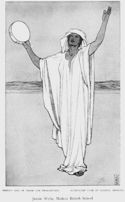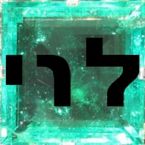Miriam
 From Conservapedia
From Conservapedia 
Miriam (Hebrew מִרְיָ֨ם, beloved, gift of God, defiant) (ca. 2422 AM–1 Abib 2552 AM[1]) (ca. 1583 BC–16 April 1452 BC) was the elder sister of Moses and Aaron, a prophetess, and a rebel who required an object lesson from God.
Contents
- 1 Life and family
- 2 Exodus
- 3 Rebellion
- 4 Death
- 5 In fiction
- 6 References
- 7 See also
Life and family[edit]
The Bible gives no specific date of her birth. But the Bible says that she died in the first month of the fortieth year of the wandering of Israel in the wilderness.Then the sons of Israel, the whole congregation, came to the wilderness of Zin in the first month; and the people stayed at Kadesh. Now Miriam died there and was buried there. Numbers 20:1 (NASB)
James Ussher estimates her life span at 130 years, similar to those of her father Amram (137 years) and Kohath (133 years). The fortieth year after the Exodus of Israel was 2552 AM. If Ussher's estimate for Miriam's life span is accurate, then Miriam was born in 2422 AM.
She was thus eleven years old when Moses was born. Her parents hid Moses for three months, and then cast him adrift in a wicker basket coated with tar and pitch. Miriam followed the basket until the current carried it to the private bathing beach of the daughter of the Pharaoh. The princess took the child out of the basket and asked whether anyone could find a nurse for it. Miriam stepped forward and volunteered to find one. The princess consented, and Miriam arranged for her mother Jochebed to nurse Moses.
Exodus[edit]
On 15 Abib 2513 AM (12 Abril 1491 BC), Miriam left Egypt, together with all the descendants of Israel, never to return. Six days later, the Israelites crossed the Red Sea, on a dry seabed after Moses had raised his rod and parted the waters. After the Israelites had crossed, the Egyptian army moved onto the dry seabed in hot pursuit. Moses raised his rod a second time, and the waters of the Red Sea closed on the Egyptians and drowned them to the last man.
In honor of this magnificent miracle, Miriam led the women in song. (Exodus 15:20-21 )
Rebellion[edit]
In the second year after the Exodus, in the fourth month, Moses married a second wife, specifically an Ethiopian. Miriam and Aaron murmured in resentment against Moses, not merely on this account but also because they felt that Moses was claiming too much credit for speaking on behalf of God. In fact, Moses never showed any presumption, as the Bible says. In response, God reminded Miriam and Aaron sharply that an ordinary prophet might receive a dream or vision from God, but God spoke to Moses face to face and in plain language. Then God afflicted Miriam with leprosy for seven days and was placed under quarantine. Seven days later, she was cleansed and could come back to camp, and on that day the Israelites struck camp and moved on. (Numbers 12 )
Death[edit]
Miriam died near Kadesh, in the fortieth year after the Exodus, shortly before the conquest of Hebron.
In fiction[edit]
Miriam appears in at least two motion picture projects depicting the Exodus and the life and career of Moses. In the Cecil B. DeMille motion picture The Ten Commandments, and also in the Jeffrey Katzenberg animated-cartoon feature The Prince of Egypt, she is shown following the progress of Moses' wicker ark. But she is not shown making the arrangement for Jochebed to nurse Moses. (In the Burt Lancaster television mini-series Moses: The Lawgiver, she is indeed shown playing that specific role.)
The two motion-picture projects also show Miriam participating later in the life of Moses. In the DeMille project, she introduces herself as Moses' sister when Moses goes into the slave enclave at Goshen, searching for Jochebed (and discovering that he had seen her earlier, under more dire circumstances). Later, as God prepares to deliver the Plague Upon the River, Miriam calmly advises all the Israelite women to draw a week's supply of water from the well, and the other women accept her advice because "when Miriam says that a thing is about to happen, it happens."
In the Katzenberg project, Moses blunders into Miriam while stalking the escaping Zipporah. Miriam then blurts out to Moses that he is not, as he has always supposed, a prince of Egypt. A frightened Aaron tries to restrain her by force, but Miriam insists on telling Moses who he really is. Moses knocks her to the sand and threatens punishment, but then Miriam sings to him a lullaby that Jochebed sang when she placed Moses in his little ark. That song triggers a memory that causes Moses to question "all [he] ever wanted" and sends him on a search of the secret archives of Seti I. There, to his horror, he discovers the records of the mass puericide in the year of his birth.
When Moses returns to Egypt, Miriam stands by Moses and encourages him to fight on, despite his initial failure and the sarcastic jibing of Aaron. Moses follows her advice and ultimately succeeds.
While both these projects tell poignant stories of Moses and his family, neither is entirely faithful to the Biblical narrative—though perhaps Miriam suffers less than do other Biblical figures from the dramatic license that each project takes with that narrative.
References[edit]
- ↑ James Ussher, The Annals of the World, Green Forest, AR: Master Books, 2003, pghh. 166, 266
See also[edit]
- Israel
- Palestine
- Biblical calendar
| ||||||||||||||||||||||
Categories: [Biblical Women] [Jewish People] [Old Testament]
↧ Download as ZWI file | Last modified: 03/02/2023 22:11:53 | 179 views
☰ Source: https://www.conservapedia.com/Miriam | License: CC BY-SA 3.0
 ZWI signed:
ZWI signed:
 KSF
KSF